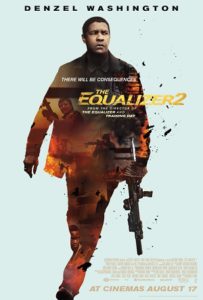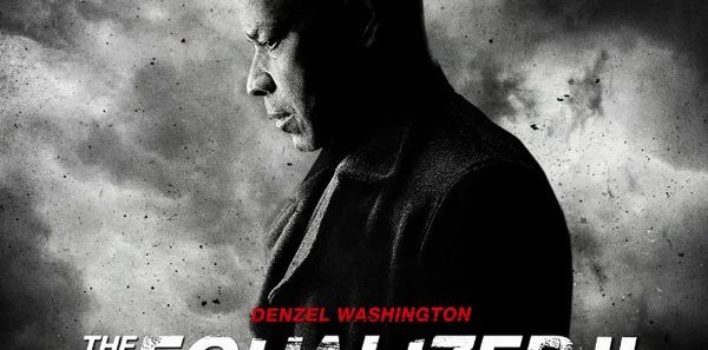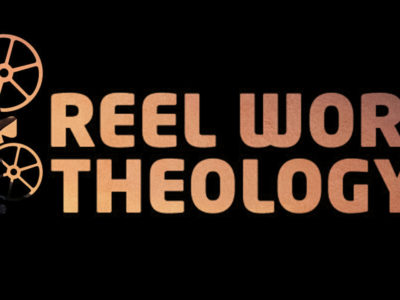Review| The Equalizer 2
 With 2014’s The Equalizer, Antoine Fuqua transformed Denzel Washington from an average Joe hardware store employee into a self-styled vigilante whose moral compass leads him into a head on collision with Russian gangsters. It was clear before the action got going that Robert McCall (Denzel) had a special set of skills more likely derived from military training than from woodworking. In large part, the success of this film can be credited to a script that convinces the audience to accept McCall’s skills without much–if any–explanation as to his background. We were fine with moving right into the action without much belief as to why we should think McCall stood a chance.
With 2014’s The Equalizer, Antoine Fuqua transformed Denzel Washington from an average Joe hardware store employee into a self-styled vigilante whose moral compass leads him into a head on collision with Russian gangsters. It was clear before the action got going that Robert McCall (Denzel) had a special set of skills more likely derived from military training than from woodworking. In large part, the success of this film can be credited to a script that convinces the audience to accept McCall’s skills without much–if any–explanation as to his background. We were fine with moving right into the action without much belief as to why we should think McCall stood a chance.
With The Equalizer 2, Fuqua and writer Richard Wenk seem to be answering this question that they successfully convinced us to ignore in the first movie. That problem aside, their attempt to open up that backstory and reveal McCall’s past as it weighs heavier on him is well-executed: the film paces out McCall’s past very well, never falling prey to what one might call an information dump, but slowly revealing bits and pieces until, even with the final scene, the full picture is only just coming into focus. The film is well worth a theater viewing, however an immediate observation I had after it concluded was that I felt every minute of the 2 hour runtime. Far too much time is spent in the first act basically showing a handful of scenarios of McCall doing just what he did in the first film to a lesser degree. If that had been summarized more quickly I think it makes for a tighter film without losing any effectiveness on where McCall’s character is mentally before people from his past begin to creep back into his life.
 Everything one may have liked in the first film is there with this sequel. McCall takes up the mantle of defending the weak against the strong, picking up largely where he left off in the first film. He even changes his career and becomes a full time Lyft driver in order to seek out such opportunities. From tracking down long lost relatives for an elderly man, to exacting justice on a group of young men who have abused a woman and sent her on her way, McCall is doing the work he feels called to do; bring things into balance. Turn wrongs into rights. He is, after all, the equalizer.
Everything one may have liked in the first film is there with this sequel. McCall takes up the mantle of defending the weak against the strong, picking up largely where he left off in the first film. He even changes his career and becomes a full time Lyft driver in order to seek out such opportunities. From tracking down long lost relatives for an elderly man, to exacting justice on a group of young men who have abused a woman and sent her on her way, McCall is doing the work he feels called to do; bring things into balance. Turn wrongs into rights. He is, after all, the equalizer.
If not for the outright violence and tendency toward vengeance, we might say McCall is doing the work of a servant not too dissimilar from the call we have as Christians. Whereas we are to care for the orphans and widows (among others, Jas. 1:27), McCall is geared toward the abused and the oppressed. We are to do such as a practice of our very religion. McCall does it as a means to bring justice. In a pivotal scene when McCall discovers his trust has been misplaced, he expounds more on what we might call his view of his purpose…
“In a perfect world we all pay for our sins, but this ain’t a perfect world. People do bad things and get away with it. I’m gonna kill you… my only regret is I only get to do it once.”
This scene is all the more meaningful because he says this to a man who has already professed the belief that there is no sin. No virtue. Just “s— people do.” And so we have staged before us the bringer of justice and the instrument of unrighteousness. But the picture is somewhat stained. McCall, for as much as we’re hoping he brings wrath onto the head of evil, is doing so out of a temporal and incomplete sense of justice, largely motivated by revenge. His fight against easily identifiable evil is, in some way, one we wish we were all brave enough to fight. It puts action behind a sense we have that evil deserves punishment. The temptation with a film like this, however, is to get caught up in the notion that if we aren’t literally punching evil in the face, we aren’t in the fight. Nothing could be further from the truth, and it’s on display even in this film.
 Early on, McCall begins the work of repairing damage that vandals inflicted on a garden and on the exterior wall of his apartment complex. Miles Whittaker, a young black man living in the apartments and played by Ashton Sanders (Moonlight), takes note of McCall’s insistence to do the work himself. There is a lot that can be unpacked here about the attitudes of youth, and perhaps more specifically in regard to young black men. Be that as it may, this sparks a relationship in which valuable life-lessons can be passed down to Miles. While there are opportunities for violence in this relationship, particularly in removing Miles from a toxic environment, no violence is inflicted. This relationship is a bright example, in a movie soaked in violence and revenge, of how we can use our good influence to fight against future evil that people may fall into had we not been there. It’s a way to bear the burdens (Gal. 6) of others while we act in love and kindness in passing on valuable lessons, which invariably lead to the most valuable of all lessons; the message of the Gospel.
Early on, McCall begins the work of repairing damage that vandals inflicted on a garden and on the exterior wall of his apartment complex. Miles Whittaker, a young black man living in the apartments and played by Ashton Sanders (Moonlight), takes note of McCall’s insistence to do the work himself. There is a lot that can be unpacked here about the attitudes of youth, and perhaps more specifically in regard to young black men. Be that as it may, this sparks a relationship in which valuable life-lessons can be passed down to Miles. While there are opportunities for violence in this relationship, particularly in removing Miles from a toxic environment, no violence is inflicted. This relationship is a bright example, in a movie soaked in violence and revenge, of how we can use our good influence to fight against future evil that people may fall into had we not been there. It’s a way to bear the burdens (Gal. 6) of others while we act in love and kindness in passing on valuable lessons, which invariably lead to the most valuable of all lessons; the message of the Gospel.





